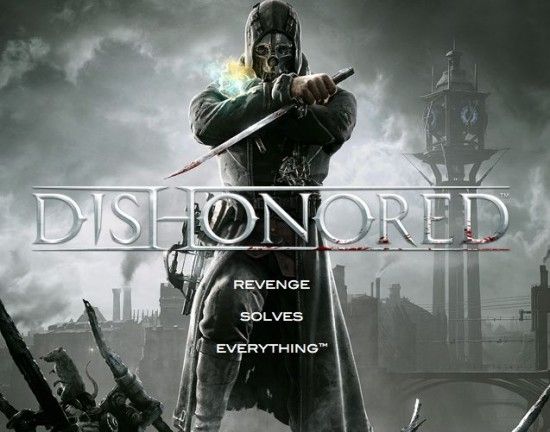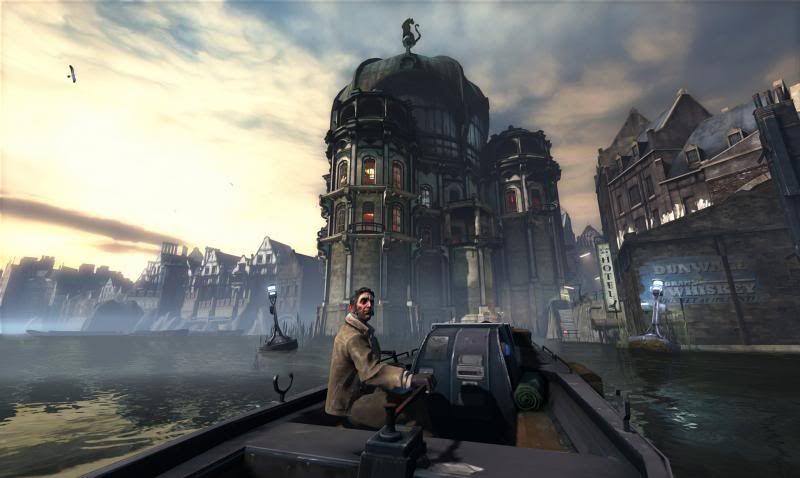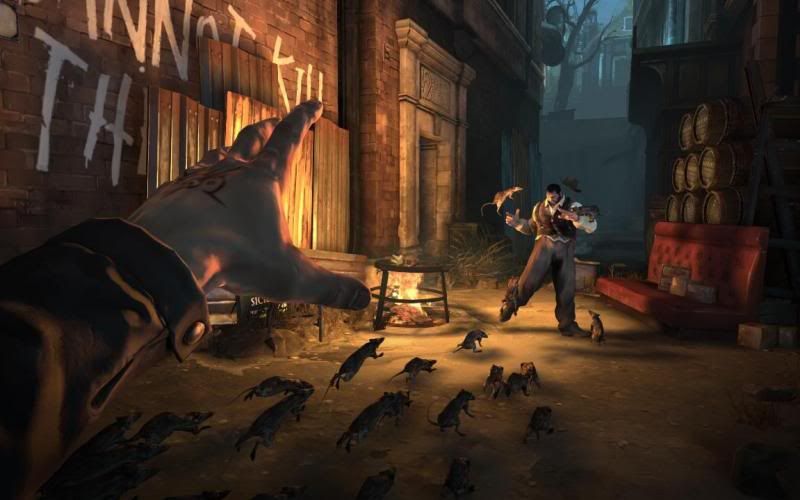Subtlety can be underrated in video games. A great deal of them rely on glitzy graphics or bombastic action to carry their experiences. Rock-solid gameplay that relies on things other than frenetic twitchy skills, a unique world with a lived-in feeling, and an interesting story with characters that have depth and complexity all contribute to a game rising above the average. In the case of Dishonored, two out of three ain’t bad.

Corvo Attano had it all. From his birthplace on Serkonos in the Empire of the Isles, he rose from obscurity and a mysterious past to become Lord Protector of the Empress and her daughter. Unfortunately, he did not foresee assassins bestowed with a dark power storming Dunwall Tower and assassinating the Empress. Framed for the murder and on the run, Corvo is on the run with few options – until the same power approaches him with an offer to help him get his revenge. Even as a plague ravages the streets of Dunwall, Corvo finds his way to a Loyalist group willing to back him up, directing him where to point his deadly dagger.
As I mentioned in the intro, world-building goes a long way in making a game both worth your time to play and memorable after. Dishonored‘s Dunwall is one of its main draws. The city seems to have a very unique mix of Victorian-style architecture and dress while things like the Tallboys and Walls of Light have a somewhat dystopian electropunk feel to them. Graffiti, conversations, artwork, and the variety of items to pick up all work together to provide a sense of immersion in the world through which Corvo will be sneaking from target to target.

From its canals to its adverts to its balustrades, Dunwall looks amazing.
Much like Deus Ex and Thief, the sneaking and the possibility of bypassing combat entirely instead of being shoved into it the way you are with other first-person games is what sets Dishonored apart. No enemy, from the standard street-walking mook to what would qualify as boss fights, needs to be confronted directly. You always get a clear indication of how aware guards are to your presence, you’re agile enough that running on rooftops is always an option, and you don’t dissolve in water so swimming can work, too – provided the vicious barracuda-like fish don’t have you for lunch. Your gadgets and powers are a big help, as well. Even the lowest level of the Dark Vision power lets you see guards through walls so you can better plan your routes, and Blink, a short-range teleport, lets you cross open areas and even lines of sight without raising the alarm. Couple these powers with the option to choke folks out and a sleep-dart crossbow, and you have the opportunity to prove that assassins don’t have to kill to be effective and feared.
This leads me into talking about some of the drawbacks to Dishonored. The number of dead bodies you create and the degree to which you use certain powers contribute to what’s called Chaos, a mechanic that functions a lot like morality systems in other games. A high Chaos rating alters the last mission of the game, and the game has multiple endings based on it, meaning that if you want the best ending, you need to be as non-lethal as possible, even if it’s more organic to silence a guard with a quick stab or you’re just fed up with a section and want to blast your way through. On top of that, the characters you encounter, especially your erstwhile Loyalist allies, are very flat and not terribly emotive, many of them having the creepy unblinking constant-eye-contact problem NPCs have had since Oblivion. I almost would have preferred text screens between missions or, even better, a voice-over from Corvo so our protagonist could have a little more personality of his own. Deus Ex (especially Human Revolution) and Thief games benefit greatly from their heroes not being silent.

“Fly, my pretty ones! FLY!!”
Still, none of these problems can prevent me from recommending Dishonored. For all of its faults, the game plays extremely well and feels rewarding when you pull off the right combination of teleporting, sneaking, distracting guards, and finding your unique route to your target. The world is rich and well-realized even if it is populated with stiff characters lacking true depth, and the visual and sound design pull you into Dunwall every time it loads up. A little characterization here, a touch of personality for our hero there, and removing the Chaos issue would make the game damn near perfect. As it is, it’s simply a very good game that fans of stealth, assassination, and games with a stand-out look and feel are bound to enjoy.


